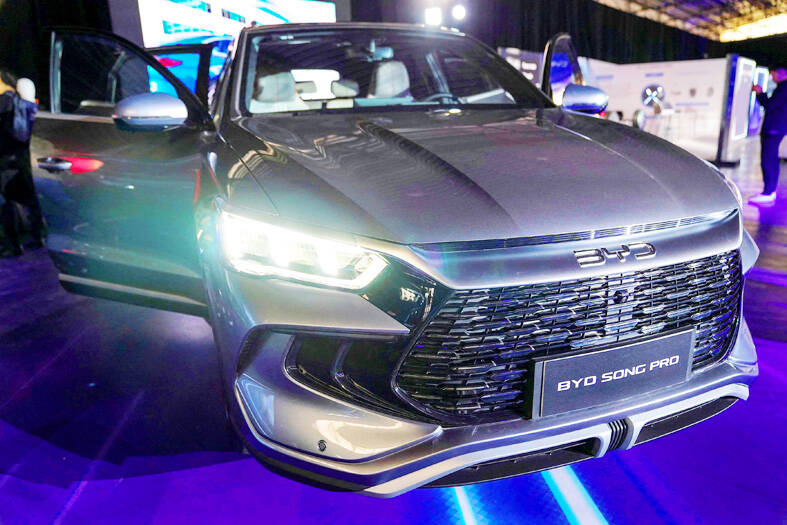Chilean truck driver Claudio Perez was dubious about his first purchase of a Chinese-made family car two years ago. However, the price and quick delivery time convinced him, and now he is a convert.
Perez, 47, is one of millions of car buyers in Latin America to have made the shift from US- and Brazilian-built cars to Chinese models over the past few years.
In 2019, the Asian economic giant sold US$2.2 billion worth of cars in the region. Last year, the figure reached US$8.5 billion, according to the UN’s International Trade Center (ITC).

Photo: Reuters
Chinese car sales represented 20 percent of the region’s total in money terms — ahead of the US with 17 percent and Brazil with 11 percent.
No other market outside Asia has a larger share of Chinese cars, according to the ITC.
“We tend to stigmatize Chinese brands, but no ... this one was super good, super good. So I don’t regret buying it,” Perez said of his first purchase, which he said he had expected to be “plastic-like.”
His next car would be Chinese too, he said.
Chinese vehicle manufacturers have redoubled their efforts in recent years to offer products at competitive prices, without compromising on quality, analysts said.
In the emerging market of electric vehicles (EV), they have taken an even bigger slice of the Latin American market, with 51 percent of all sales.
Almost all electric buses in the region are made in China.
“The growth of Chinese car manufacturers in recent years has been exponential, thanks to significant improvements in quality, technology and design,” said Andres Polverigiani of Nyvus, a consultancy firm that studies vehicle competitiveness.
In the US and Europe, both with their own automotive industries, protective import tariffs have slowed China’s advance, unlike in Latin America.
In Chile, with near-zero duties, Chinese models represented about 30 percent of car sales last year.
In Mexico and Brazil, Latin America’s biggest car producers, China is also making inroads.
Chinese giant BYD Co (比亞迪) is building its largest EV plant outside of Asia in Camacari, Brazil, with a targeted production capacity of 150,000 units every year.
In Latin America, Chinese cars, which tend to be cheaper than rivals, have enabled segments of the middle- and low-income population to buy their first vehicle, Economic Commission for Latin America and the Caribbean economist Sebastian Herreros said.
It has also allowed the introduction of cleaner engine technologies in polluted metropolises such as Santiago, Bogota and Mexico City.
“All our countries must adopt electromobility quickly, it is almost a question of survival,” Herreros said. “China is an ideal partner: It has the necessary production capacity and offers competitive prices.”

IN THE AIR: While most companies said they were committed to North American operations, some added that production and costs would depend on the outcome of a US trade probe Leading local contract electronics makers Wistron Corp (緯創), Quanta Computer Inc (廣達), Inventec Corp (英業達) and Compal Electronics Inc (仁寶) are to maintain their North American expansion plans, despite Washington’s 20 percent tariff on Taiwanese goods. Wistron said it has long maintained a presence in the US, while distributing production across Taiwan, North America, Southeast Asia and Europe. The company is in talks with customers to align capacity with their site preferences, a company official told the Taipei Times by telephone on Friday. The company is still in talks with clients over who would bear the tariff costs, with the outcome pending further

A proposed 100 percent tariff on chip imports announced by US President Donald Trump could shift more of Taiwan’s semiconductor production overseas, a Taiwan Institute of Economic Research (TIER) researcher said yesterday. Trump’s tariff policy will accelerate the global semiconductor industry’s pace to establish roots in the US, leading to higher supply chain costs and ultimately raising prices of consumer electronics and creating uncertainty for future market demand, Arisa Liu (劉佩真) at the institute’s Taiwan Industry Economics Database said in a telephone interview. Trump’s move signals his intention to "restore the glory of the US semiconductor industry," Liu noted, saying that

NEGOTIATIONS: Semiconductors play an outsized role in Taiwan’s industrial and economic development and are a major driver of the Taiwan-US trade imbalance With US President Donald Trump threatening to impose tariffs on semiconductors, Taiwan is expected to face a significant challenge, as information and communications technology (ICT) products account for more than 70 percent of its exports to the US, Chung-Hua Institution for Economic Research (CIER, 中華經濟研究院) president Lien Hsien-ming (連賢明) said on Friday. Compared with other countries, semiconductors play a disproportionately large role in Taiwan’s industrial and economic development, Lien said. As the sixth-largest contributor to the US trade deficit, Taiwan recorded a US$73.9 billion trade surplus with the US last year — up from US$47.8 billion in 2023 — driven by strong

STILL UNCLEAR: Several aspects of the policy still need to be clarified, such as whether the exemptions would expand to related products, PwC Taiwan warned The TAIEX surged yesterday, led by gains in Taiwan Semiconductor Manufacturing Co (TSMC, 台積電), after US President Donald Trump announced a sweeping 100 percent tariff on imported semiconductors — while exempting companies operating or building plants in the US, which includes TSMC. The benchmark index jumped 556.41 points, or 2.37 percent, to close at 24,003.77, breaching the 24,000-point level and hitting its highest close this year, Taiwan Stock Exchange (TWSE) data showed. TSMC rose NT$55, or 4.89 percent, to close at a record NT$1,180, as the company is already investing heavily in a multibillion-dollar plant in Arizona that led investors to assume